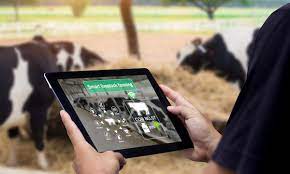Revolutionizing Veterinary Extension through ICT: Embracing Technology for Better Animal Health
Jyoti Meena*, Subhash Chand
Department of Veterinary and Animal Husbandry Extension Education, Post Graduate
Institute of Veterinary Education and Research (PGIVER), Jaipur, Rajasthan (302031) India
*E-mail: drjiya96@gmail.com
Introduction
In today’s fast-paced world, Information and Communication Technology (ICT) has permeated virtually every industry, and veterinary extension is no exception. The application of ICT in veterinary extension has opened up new possibilities, transforming the way veterinarians interact with their clients and improving animal health outcomes. In this article, we will explore the significance of ICT in veterinary extension, its impact on animal care, and how it benefits both veterinarians and pet owners alike.
- ICT Tools and Applications
The integration of ICT in veterinary extension encompasses a wide range of tools and applications that aim to streamline communication and enhance veterinary practices. Some of the key ICT tools used in this field include:
a) Telemedicine: Telemedicine has emerged as a game-changer in veterinary care. It allows veterinarians to remotely diagnose and treat animals through video conferencing and other digital communication platforms. Pet owners can now seek expert advice without the need to physically visit a veterinary clinic, making veterinary care more accessible and convenient.
b) Mobile Apps: The rise of mobile applications has led to the development of numerous apps catering to animal health and care. These apps provide valuable information on pet care, vaccination schedules, and even symptom checkers to help pet owners identify potential health issues.
c) Online Portals: Veterinary clinics and institutions are now setting up online portals to offer resources and information about animal health, preventive care, and treatment options. These portals enable pet owners to access information at their convenience and stay informed about their pets’ well-being.
d) Data Management Systems: ICT has also facilitated the implementation of efficient data management systems in veterinary practices. Electronic health records, appointment scheduling, and reminders for vaccinations can now be easily managed using dedicated software, streamlining administrative tasks and improving overall service.
2.Enhanced Communication and Collaboration
ICT has revolutionized communication between veterinarians and pet owners. In the past, a lack of easy communication channels often led to delays in seeking veterinary advice, resulting in compromised animal health. With ICT tools, pet owners can now connect with veterinarians instantly, sharing images, videos, and medical history, enabling quicker and more accurate diagnoses.
Moreover, ICT has facilitated collaboration among veterinarians from different locations. This means that complex cases can be discussed among experts, leading to improved decision-making and treatment outcomes. Remote consultations have made it possible for veterinarians to extend their expertise beyond geographical boundaries, ultimately benefiting animals worldwide.
- Education and Training
ICT has also revolutionized the way veterinary professionals receive education and training. Online courses, webinars, and virtual workshops allow veterinarians to stay updated with the latest advancements in their field without the need for travel. This has fostered continuous learning, ensuring that veterinary professionals are equipped with the knowledge and skills required to provide the best possible care.
- Challenges and Future Prospects
While ICT has brought about numerous benefits, some challenges must be acknowledged. Reliable internet connectivity is crucial for the successful implementation of ICT in veterinary extension, especially in rural or remote areas where access might be limited. Additionally, ensuring data privacy and security is vital when dealing with sensitive medical information.
The future of ICT in veterinary extension looks promising. Advancements in artificial intelligence and big data analytics will further enhance the accuracy of diagnostics and treatment planning. Wearable health monitoring devices for animals and telemedicine robots are also being explored to expand the scope of remote care.
Conclusion
Information and Communication Technology has transformed veterinary extension, offering innovative solutions to improve animal health and well-being. From telemedicine to mobile apps and online portals, the integration of ICT has revolutionized the way veterinarians and pet owners interact. Embracing these technological advancements will undoubtedly lead to a brighter and healthier future for our beloved animal companions. As ICT continues to evolve, the veterinary industry must adapt and seize the opportunities it presents to ensure the best care for animals across the globe.


